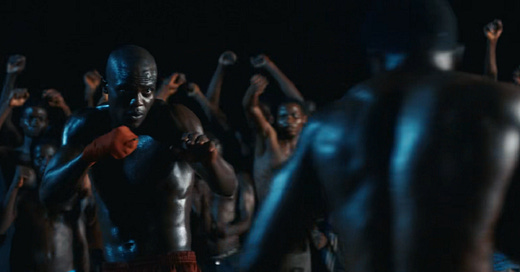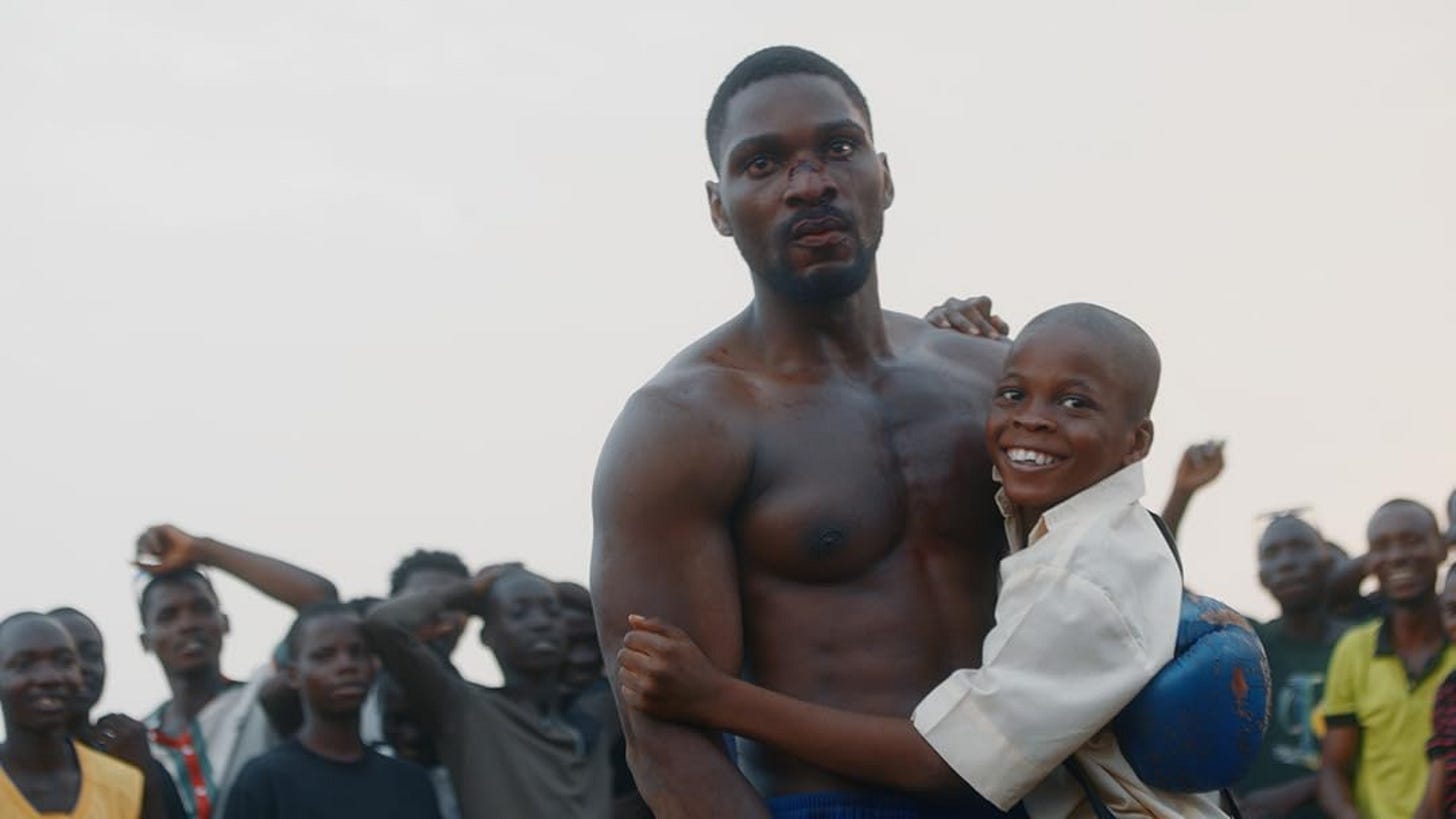Suky is a revenge thriller from the same studio that gave us Breath of Life, a faith-based hit that left audiences contemplating the power of surrendering to a higher force. But this time, faith takes a back seat to vengeance. Our main character, Sunkanmi aka Suky (James Damilare) watched his father (Tobi Bakre) get killed as a child, and wants to get even. Simple. As a young man now, his life has been shaped by loss, injustice, and an undying need for retribution. His journey is one of pain, patience, and punishment, and through his eyes, we experience a world where survival means fighting back, no matter the cost.
Warning: This review contains spoilers!
Sunkanmi’s story begins with a childhood spent idolizing his father, a local boxing champion. Skipping school to watch his old man fight, he witnesses something that shakes his belief in the hero he holds so dear. His father isn’t losing matches because he’s outclassed—he’s doing it on purpose, taking bribes from shadowy figures who lurk in the backseats of fancy cars. The realization crushes the boy, staining his father’s image in his eyes. But what follows is even worse. Perhaps driven by guilt or a sudden desire to reclaim his honor, Adigun, Suky’s father, refuses to throw his next fight. It is a decision that seals his fate. We’ve seen this story before, and we know how it ends. Men who break the rules of the underworld don’t get to walk away. And so, right in front of his son, Adigun is murdered, his defiance met with swift and merciless punishment. At that moment, young Sunkanmi dies, and Suky is born—hardened by grief, his soul consumed by a thirst for revenge.
For 12 years, Suky is given shelter and a semblance of stability by his adoptive guardian, a lawyer who, one assumes, had ties to his father. But fate isn’t done testing him. The same man who killed his father resurfaces, now at the center of a case his guardian is handling. The confrontation ends with the lawyer dead and Suky framed for the crime. Just like that, he is tossed into the dreaded Aja Prison, a place where brutality reigns and survival is a privilege, not a right. Here, underground Dambe boxing becomes his ticket to redemption, but the road to vengeance is littered with bloodshed and a system designed to break men like him before they ever get the chance to fight back.
For a film built on the backbone of tragedy and vengeance, the performances do much of the heavy lifting. The younger Suky swaps a lively persona for one of quiet brooding after his father’s death, setting the tone for the hardened man he will become. James Damilare, as the adult Suky, picks up the baton and does a lot with very little dialogues. His expressions do most of the talking. It’s a choice that works in some ways, but at times, his performance feels unduly monotonous and lacks the artistry needed to truly pull the audience into the turmoil he carries within. His physicality is impressive, but beyond the surface, there’s a hunger for more—more layers, more emotion, more fire beneath the quiet rage. What we get from him works for the most part, at least enough to not lose the audience’s attention.
Tobi Bakre, though his time as Adigun is short, leaves an impression, and Philip Asaya, ever dependable, brings his usual weight to his role despite limited screen time. However, I’d like to see Asaya try a role different from the brooding characters he has become known for. I understand his physic might be limiting the kind of roles he gets offered, because even fewer roles have the depth of story and pocket to require actors to alter their physical looks to enter a character’s sleeves. But that’s what actors are known for and industry practitioners in this part of the world need to catch up. To be an actor is to have the ability to disappear and re-appear as characters that bear little to no semblance to one’s real life persona. Olarotimi Fakunle does this well, and he comes through once again in Suky. As Marshal, the ruthless head of Aja Prison, he steals the show. Marshal is a man with a clear ambition—to climb the ranks of power and escape the prison yard, trading bars for politics. He is conniving, cruel, and utterly captivating. His unraveling, when his dreams slip through his fingers, is one of the film’s strongest moments. Fakunle disappears into the role, making Marshal the most fleshed-out character in a film where motivations often feel muddled or rushed.
If Suky stumbles, it’s in its pacing. The film moves at breakneck speed, barely giving us time to settle into one moment before thrusting us into another. We watch Suky suffer injustice after injustice, yet beyond his misfortune, we learn little about the man himself. He is defined by his pain, but what else? What does he dream of beyond vengeance? What anchors him? The film leaves these questions largely unanswered, making it hard to connect with him beyond sympathy for his circumstances and his thirst for vengeance. Characters come and go, some with motivations that feel half-baked. His trainer in prison, played by Ibrahim ‘Itele’ Yekini, has a sudden change of heart that isn’t fully explained, and Toyin Oshinaike’s Baba Nla, among others, feels like an idea rather than a fully realized character. We never learn what is driving any of them.
Then, there is the matter of convenience. The same man who killed Suky’s father also kills his guardian, then frames him, then happens to be his final opponent in an underground prison fight. At some point, it feels less like fate and more like a narrative shortcut, a string of coincidences so neatly arranged that they strain credibility. And if that wasn’t enough, the supposed female romantic character played by Bimbo Ademoye—introduced to serve as Suky’s final moral dilemma—feels unearned, their connection flimsy at best.
And yet, Suky has moments that shine. The camera work captures the grit and desperation of its world, the fight sequences carry weight, and when the film slows down enough to let its characters breathe, there are glimpses of something deeper. But it never quite reaches its full potential. It is engaging but not profound. Brutal, but not entirely gripping. A solid attempt at a revenge thriller, but one that leaves you wishing it had taken just a bit more time to flesh out its world and the people within it.
By the time the credits roll, there is no divine intervention, no justice beyond what Suky carves out for himself. But even as he stands victorious, one can’t help but wonder—was it ever enough? What next? In the end, Suky tells a story of loss and vengeance, but whether it tells it well enough to be truly unforgettable is another question entirely.
Suky is streaming on Prime Video.
Side Musings:
How is a Nigerian senator regularly attending illegal prison fights? Doesn’t he have actual work to do?
Ijaya is the new prison warden? LMAO! Is he now a government staff? And dressed like that?
How did the senator and his Aje Gang friend suddenly forget that Suky is on their kill list? With no Marshal to keep him in check, he’s more of a loose cannon than ever. If there was ever a time to kill him, it was yesterday—yet somehow, they let him be.
I can only imagine how long it took them to set up that shot of the bird being freed. Directing humans is hard enough—animals and birds are even harder.
PS: If you think it’s CGI, keep it to yourself. I don’t want to hear it.
I have a video review of the movie on YouTube, too. Click HERE to watch it.
Like this post? Read More.





